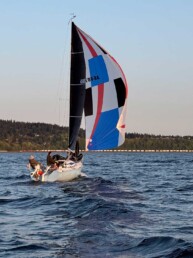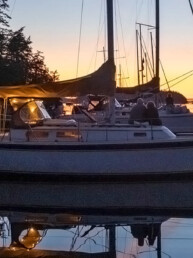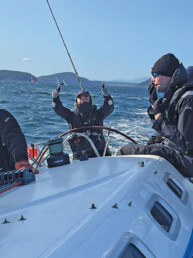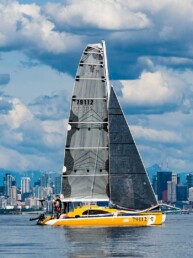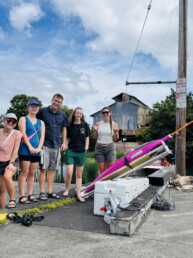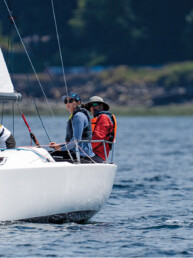I’ve always thought of the Wooden Boat Festival in Port Townsend as a broad, winding river full of stories and adventures.
Each time I attend, I jump in with a destination in mind, but once in the current, I’m pulled along from one pleasantly unexpected island to another.
Last week, I went to the festival for the first time in years. Not only to jump into that river again, but to put closure on my voyage through the Inside Passage back in 2019. After I returned from that trip, people kept asking what it was like. I’d taken over a thousand pictures along the way, but couldn’t figure out which of those images could actually convey what I experienced during my weeks on the water.
So instead of a traditional slideshow, I created an immersive storytelling performance piece and planned a series of shows. Unfortunately, the pandemic canceled all but the initial presentation. During the strangeness of the ensuing years, I started to think that the moment had passed. A few persistent friends kept asking about it, and the festival seemed like a perfect opportunity to revive it.
On Thursday afternoon, I sailed up to the rocky entrance of the Port Hudson Marina and radioed the harbormaster for permission to enter. “WELCOME to the festival,” a warm, enthusiastic voice boomed over the VHF. “Come on in, Row Bird!”
I rowed up to the shallow edge of D-dock, opposite a 32-foot Grand Banks motor-cruiser. Its captain, Jeff, gave me a wave and a friendly smile. Despite piloting one of the smallest vessels there, I felt welcome immediately.
After securing Row Bird to the dock, I headed for a restroom break ashore. But I hadn’t even reached the gangway when a sapphire hull caught my eye. It was my friend Alex’s new 24-foot boat, Camas Moon. “How was the trip over from Victoria?” I asked. Soon, despite the signals from my bladder, I found myself captivated by the details of his circuitous route.
My presentation was scheduled for Saturday morning, and I worried that I’d spend Friday, the first day of the festival, obsessing over my preparedness. To avert my anxiety, I made a long list of demonstrations and booths that I hoped to see, while also setting aside time to greet visitors on Row Bird.
I should have known better than to worry, because soon I was immersed in the festival’s river of stories once again, this time caught in an eddy of people stopping by my boat. A woman told me about learning to sail in Port Angeles and was intrigued by the compact nature of my boat. “Come to Portland, and we’ll go sailing,” I promised. Then came a couple whose last boat was destroyed by a hurricane in Guatemala; undaunted, they were building their own canoe yawl for cruising to Belize. The stories just kept coming — and I didn’t make it to a single presentation.
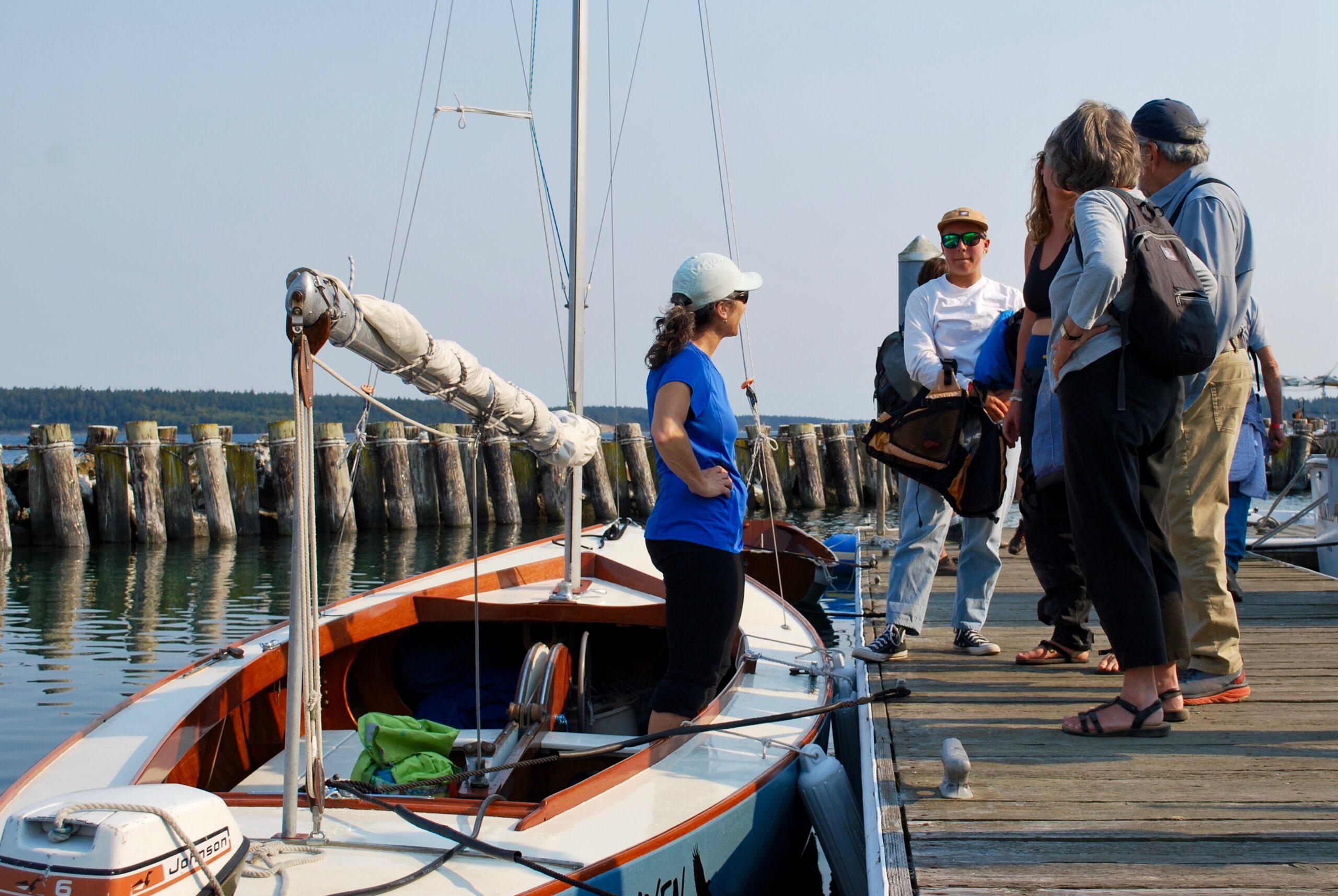 By late afternoon, I had been sucked down a side channel; a friend’s son convinced me to take him on as crew in the 26-foot-and-under sailboat race. The wind seemed gusty, and I was a bit reluctant to sail with someone I barely knew. But as we rowed out, he recounted his experience racing small boats in Portland, and I began to relax. “Chris, we’re going to be non-competitors in this race.” I told him. “We’re going to follow everyone, with the goals of having fun, staying upright, and not hitting anyone.”
By late afternoon, I had been sucked down a side channel; a friend’s son convinced me to take him on as crew in the 26-foot-and-under sailboat race. The wind seemed gusty, and I was a bit reluctant to sail with someone I barely knew. But as we rowed out, he recounted his experience racing small boats in Portland, and I began to relax. “Chris, we’re going to be non-competitors in this race.” I told him. “We’re going to follow everyone, with the goals of having fun, staying upright, and not hitting anyone.”
With two reefs in the mainsail, we started tacking back-and-forth near the starting line. As the starting gun went off, I realized we were under-canvassed, so we sailed past the line and hove-to for a moment to shake out the reefs. In the process, we drifted back towards the committee boat, narrowly missing it as I hauled the sail back up. Fortunately, we moved on to our other goals: having fun and rounding the course without adding any new (and unfortunate) stories of drama to the festival waters.
On Saturday morning, a few minutes before my presentation, I walked up to the Adventure Stage. “What, you don’t have any slides?” one of the AV guys asked.
“This is going to be interesting,” his partner joked.
Despite secret fears that only my wife and a few hardcore boating buddies would attend, by start time, most of the seats in the room were filled, and soon newcomers were sitting on the floor. Taking a deep breath (and summoning dramatic skills honed by years of reading bedtime stories) I launched into my first episode, a tale about anchoring off an island in British Columbia. Smiles broke out across the crowd. Encouraged, I went on to describe encounters with whales and sea lions, followed by a story of a frightening crossing, during which I demonstrated in real time the donning of a drysuit in harrowing conditions.
Standing in front of so many knowledgeable sailors, I felt self-conscious about sharing my experiences. But that afternoon, many of those same sailors drifted over to the dock where Row Bird and I were stationed, bringing adventures of their own. “When I was younger, we went on a trip up past Desolation Sound and got our behinds handed to us,” an older man told me. One couple described their joy in running rivers in a $1,500 wooden drift boat. The deluge of stories continued all day, and I found myself smiling so much that my cheeks began to hurt.
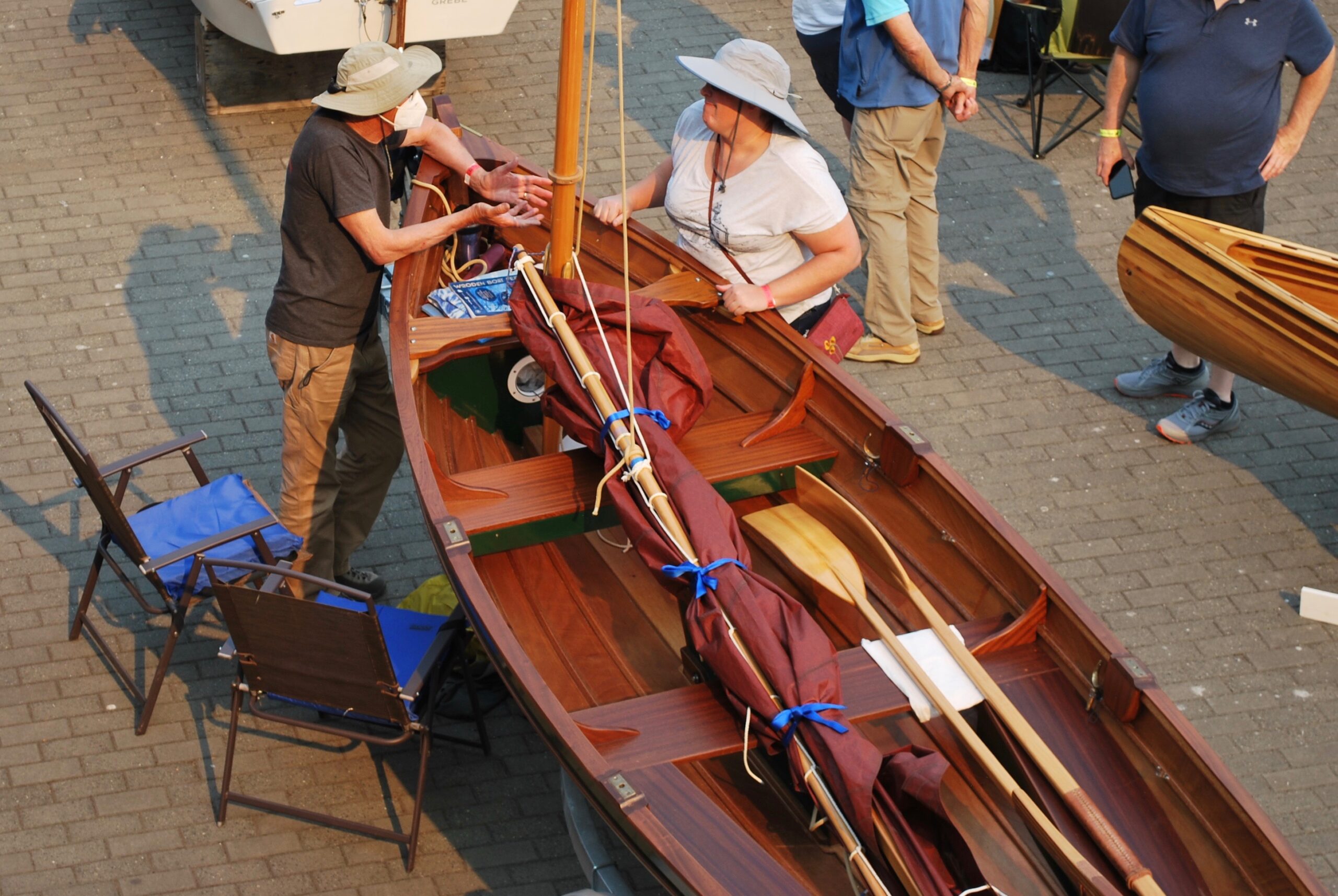 Some folks who stopped by had no stories of their own — at least, not yet. “We really appreciate your writing and liked your show,” one woman said. “We just have SUPs, and we’re not adventurers, but this kind of thing inspires us to get out near our house.” Others came to learn and ask questions, “I’ve always wanted to go to Canada…do you think I could do it with my 24-foot power boat?”
Some folks who stopped by had no stories of their own — at least, not yet. “We really appreciate your writing and liked your show,” one woman said. “We just have SUPs, and we’re not adventurers, but this kind of thing inspires us to get out near our house.” Others came to learn and ask questions, “I’ve always wanted to go to Canada…do you think I could do it with my 24-foot power boat?”
Or, “I was thinking of building a boat like this; how hard was it to complete?”
These visitors brought me back to my first festival, nearly 15 years ago. I remembered feeling the same sense of possibility then, and asking similar questions. I remembered how welcoming the experienced boaters were, and how patiently they answered my lubberly queries. I’ve always appreciated that whether someone comes to the festival in a 30-pound kayak or a ten-ton schooner, we’re all respected as part of the wooden boat family. Now, talking to folks just starting out in their boating adventures, I felt proud to be part of that tradition.
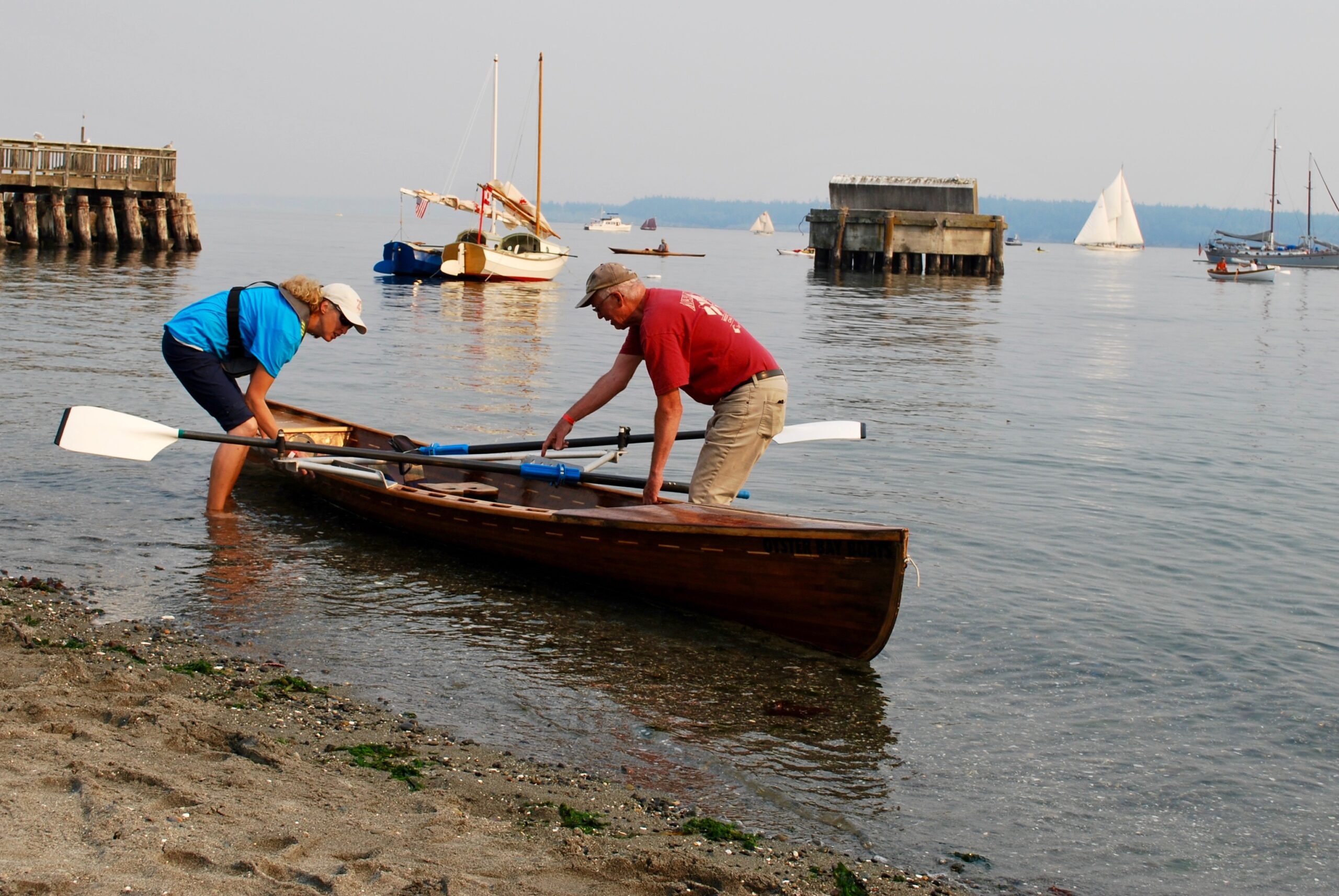 After three days of soaking up techniques, ambling from cockpit to cockpit for drinks, and drifting down the river of stories with friends new and old, I felt a twinge of sadness as I watched boats around me prepare to depart. A fellow sailor who stopped by was clearly feeling the same way. The festival was the high point of his summer, he confided, and it also represented the end of good weather for carefree cruising. I understood what he meant. But my outlook was still buoyant. Each stop along this year’s festival river had energized me, and I was already thinking about all the places I wanted to voyage next season.
After three days of soaking up techniques, ambling from cockpit to cockpit for drinks, and drifting down the river of stories with friends new and old, I felt a twinge of sadness as I watched boats around me prepare to depart. A fellow sailor who stopped by was clearly feeling the same way. The festival was the high point of his summer, he confided, and it also represented the end of good weather for carefree cruising. I understood what he meant. But my outlook was still buoyant. Each stop along this year’s festival river had energized me, and I was already thinking about all the places I wanted to voyage next season.
Bruce Bateau
Bruce Bateau sails and rows traditional boats with a modern twist in Portland, Ore. His stories and adventures can be found at www.terrapintales.wordpress.com

